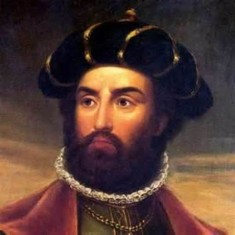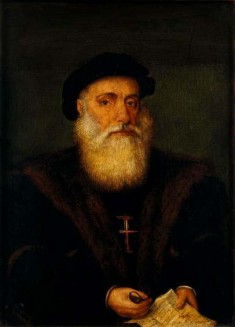Vasco da Gama is one of the most respected explorers in world history. A leader in the era known as the Age of Discovery, Vasco da Gama was the man who commanded ships from Europe to India. His contributions to exploration forever changed the scope of trade, merchant expansion, and the growth of European influence throughout the world.
Early Years
The exact place and year of birth for Vasco da Gama is not exactly known. He may have been born in the seacoast region of Alentejo in Portugal, which was known for its fishing industry. More than likely, he developed a love for the sea after being exposed to the many fishing adventures he grew up around.
His father was a knight who served in prestigious factions of the military. We know very little about the upbringing and early life of da Gama because records were never kept. What is known is he was a serious student of navigation and mathematics. He also followed his father’s footsteps and joined the Military Order of Saint James of the Sword.
Exploring Parts of Portugal
During the early 1500s, there was great interest in seafaring exploration on the part of Portugal. Many of the early explorations were for gold and they focused mainly on the African coast. Overall, these explorations were not anywhere nearly as successful as they needed to be.
One of the more lucrative trade and merchant routes was the one that led to the spice markets of India. Finding a route to India that entailed traveling around Africa was a huge priority to the monarchy in Portugal. A discovery was made that revealed a possible route from what is today modern South Africa could open a portal to India. Only a talented explorer would be able to actually devise the route and actually command a ship to follow the route.
Vasco da Gama would become this explorer and he was tasked with the responsibility by Munual I. The offer, ironically, was originally intended to be given to Vasco da Gama’s father. The young da Gama was afforded the opportunity based on his successes in protecting Portuguese interests from French plunderers on the African Gold Coast.
There were great dangers following the traditional routes. The Mediterranean was highly disputed and Arabia was extremely dangerous. Vasco da Gama was able to find a direct route and the impact was enormous. His discoveries led to Portugal not only establishing a presence in India, but they were able to expand their empire into all of Asia.
Journeys of Vasco da Gama
 The first voyage of Vasco da Gama departed on July 8, 1497. The voyage traveled through various ports and destinations including Mombasa, Mogadishu, Malindi, and, finally, Calcit, India. On August 29, 1498, de Gama left to return home to Portugal. He either did not heed or simply underestimated warnings about the monsoons at this time of the year and the journey was an extremely frightening one.
The first voyage of Vasco da Gama departed on July 8, 1497. The voyage traveled through various ports and destinations including Mombasa, Mogadishu, Malindi, and, finally, Calcit, India. On August 29, 1498, de Gama left to return home to Portugal. He either did not heed or simply underestimated warnings about the monsoons at this time of the year and the journey was an extremely frightening one.
Mercifully, the ships were able to reach the West African coast within a few months. Unfortunately for historians, the journal of de Gama ends once he does reach the coast. As a result, historians are only able to speculate on what the rest of his journey to return to Portugal entailed. What many do know is when he did reach his home country, he was treated as a hero.
Death and Legacy of Vasco da Gama
The legacy of Vasco da Gama is that of being one of the greatest explorers of his era. Without his trailblazing adventures, Portugal and they rest of the western world may never have made any serious inroads into India and Asia. King Manuel I rewarded da Gama quite well. He handed over to him the town of Sines, which turned out to be a political headache for a time. The town, prior to the king opting to hand it to da Gama, belonged to the Military Order of Saint James of the Sword. Afterwards, he set sail on a second voyage, although it was not as famous as his first.
In time, da Gama enjoyed his days retired from being a great explorer. He got married and collected a pension for many years. He passed away on December 23, 1524.
